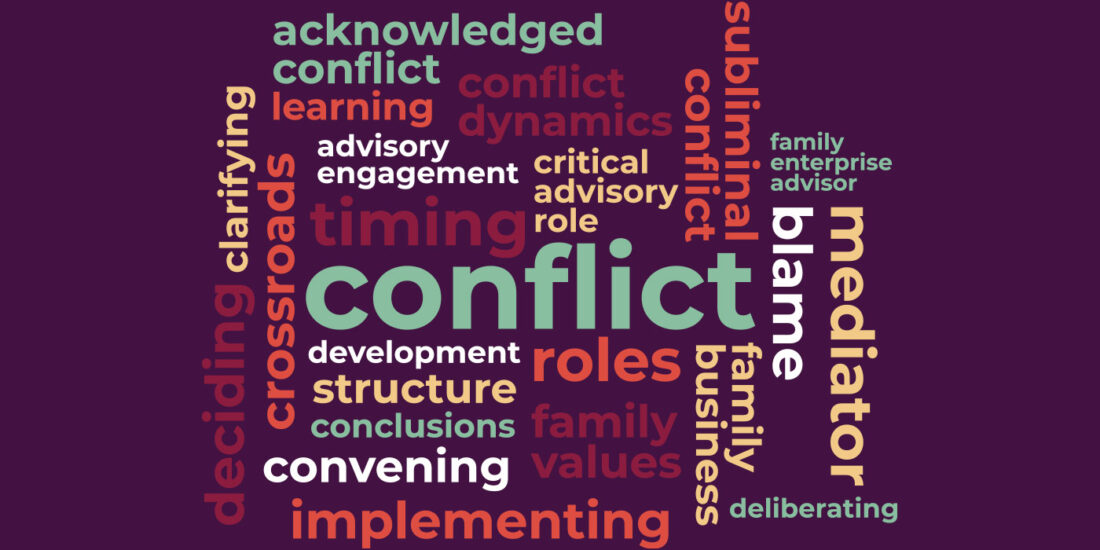Points of significant change and transition in the life of a family business lead to predictable psychological reactions. Advisors who help families understand and anticipate these reactions can aid in instituting preventive measures that might significantly reduce disaffection and conflict.
The prescription comes down to a single basic principle: Put the predictable pain “on the table,” and talk about it — before, during and after the transitional event. The toxic potential of a transitional event dissipates with airing, continued awareness, deepening understanding, and some straightforward strategies.
For many people, it is counterintuitive to bring up anticipated bad feelings, conflict, or possible negative outcomes. We want to hope for the best, not voice our fears and doubts. But in fact, it is much better to voice potential dangers and obstacles and agree to face them as a unified group. The potential benefits? Smoother transitions, preservation of high-level functioning across the enterprise; as well as the avoidance of rancor, sibling splits, and generations at odds with each other.
Stress point 1: Division in status
Status divisions come in various forms: shareholders who work in the business and those who do not; the senior generation and the successor generation; family members who concentrate on philanthropy and those who run the business.
Whenever a group is divided, especially when one group has insider status and the other is “outside,” group psychological regression is predictable. This translates to heightened emotions and more irrational forces infiltrating decision making. Individuals on both sides of the divide will feel more vulnerable and therefore may be more defensive, aggressive, or mistrustful.
When a family faces a division-of-status transition such as a buyout of some family members’ company stock holdings, negative feelings and behaviors such as scapegoating, shame, blaming, and contempt are likely to emerge.
While most family business stakeholders are acutely aware of where everyone stands regarding one or another’s status, they are less likely to understand the impact of unconscious group psychological forces that come into play.
Preventive measures: Articulate the importance of avoiding an “us-vs.-them” mindset early in the conversation. Acknowledge that this is a risk and that only thoughtful discussion can prevent its negative effects. Actively demonstrate that bonds and mutual regard will remain despite the changes. Anticipate (out loud) that one group might feel ashamed about its situation; another might feel subtle contempt. Create an active expectation that everyone involved will look out for and label signs of in-group/out-group language or actions.
Be especially thoughtful about communications structures. As one group is removed from decision making, it will necessarily be excluded from some business communications. Advise families to keep information flowing to those whose engagement has lessened. Information silos can contribute significantly to us vs. them scenarios. Accomplishments of the family members who don’t stay active in the business should be actively recognized and supported.
Stress point 2: The classic midlife crisis
Encourage the family to keep a supportive and watchful eye on the 40-somethings. Though a cliché, there is such a thing as a midlife crisis. Intense psychological undercurrents are aroused in early midlife. The consequences of decisions about vocation and relationships made in one’s 20s or early 30s have become clear. The pressures of early career growth and raising a young family have abated somewhat and space opens for questions like “Is this all there is?” or “Is this the life I want to be living?” This is the time when a poor fit between career choice and personality becomes evident. If career decisions were made to please parents or fulfill a perceived duty, dissatisfaction and a sense of entrapment can become acute.
There is a lot of turmoil, passion and energy activated in this life phase, which can lead to destructive outcomes — affairs that break up families, bitter divorces, reckless business initiatives. But it’s also a time of great potential to alter course if necessary or commit to the family enterprise in a deeper way.
Preventive measures: Help families anticipate that key family members in their early 40s will undergo a time of tumult and stress, but also one of opportunity. Try to structure employment agreements to avoid “golden handcuffs” so that a change in career path doesn’t lead to unacceptable financial loss. Focused retreats can be set up for members facing this crucial life change, acknowledging that this is a good time to reassess where you are and where you want to be.
What if a 40-year-old who is being groomed to take over the family enterprise discovers, through a reflective process like this, that he or she is not sure he’s on the right path? This would be disruptive to the enterprise — but far less disruptive than if an anointed future leader buries his/her own dreams and desires under a crushing sense of obligation to the family enterprise, sowing seeds of resentment and frustration that can lead to much worse turmoil in 10 or 15 years.
The satisfaction and security of this cohort is crucial to succession planning. The older generation will only be willing to let go of control to members of the successor generation who have examined their purpose deeply and have found it to be aligned with the future of the family business.
Stress point 3: Starting older
Very successful people reach a point in life, predictably somewhere between 60 and 65, where they are still performing at the top of their game, but have done just about everything they set out to do. They’ve built or run businesses, served on boards, led community organizations. A younger generation is qualified and ready to take over — but room at the top must be opened for the next generation.
In the past, a 65-year-old might have had some years left, but not that many years of good health and productive work capacity. Today, people at that age have 10, 15, or more years of creative, productive work ahead of them. But doing more of the same until they become disabled or die in the saddle is likely not good for them or the family enterprise.
I call this life phase “starting older.” People in this developmental phase are faced with the question, “What do I do now?” For a leader at 65 to let go, he or she must have a stimulating and interesting future to look forward to, one that is as vital and enlivening as the work life he or she has led for the last 40 years.
Failure to recognize and prepare for this crucial transition can lead to a cascade of problems. The head of a business or foundation who sees nothing but a void ahead is going to find excuses to keep the younger generation from stepping up to leadership. The unprepared can feel a threatened loss of identity and sense of control. Because of this sense of threat, succession plans are ignored or inadequate.
Younger family members can become frustrated at the lack of opportunities to advance to leadership and even give up on the enterprise. Older members who won’t let go can resist change because it might lead to their own obsolescence.
Promising a decrease in stress and time to travel rarely assuages the doubts and anxiety of high-powered individuals. They are accustomed to unending responsibility and demands on their time and intelligence. What’s needed is a vision of a life that is different but equally intense and able to engage the core of a purposeful, powerful, highly effective individual. The upside of facing this new phase of life with clarity and wisdom can be tremendous.
Preventive measures: Advisors can help families initiate an ongoing conversation about this phase of life, involving members of all ages. Questions like “What am I going to do after I’ve accomplished all my goals?” should be a part a process of self-reflection for family members at all stages of their careers.
Family members heading toward 60 need to start thinking seriously about the next phase of life. Retreats or workshops for the 55- to- 60-year-old cohort would start a transition process going comfortably before decisions need to be made. Provide them with resources to help them consider what they might do next. Encourage bringing in 70-somethings who have successfully navigated this transition to tell their stories to family members.
What about the 65 to 75-year-old leader of the family enterprise who can’t let go? At this point it’s too late for prevention, but as an outside advisor you can help him or her understand the psychological issues they’re grappling with and plan a satisfying personal path forward.
Adapting to change
All these stress points involve change, which always makes people anxious even though it can also be energizing and exciting. Family enterprise advisors who bring understanding of the psychological forces at play can encourage discussions within the family that can prevent crises down the road.
About the contributor
 Prudence Gourguechon, MD, is principal of Invantage Advising in Chicago. She helps leaders in business navigate critical transitions by understanding the underlying psychological forces at work. She is a past president of the American Psychoanalytic Association. Prudence will be facilitating a Snap Learning Session in Chicago, entitled “Conversations” with presenters Steve Legler and Natalie McVeigh. She can be reached at prudy@invantageadvising.com.
Prudence Gourguechon, MD, is principal of Invantage Advising in Chicago. She helps leaders in business navigate critical transitions by understanding the underlying psychological forces at work. She is a past president of the American Psychoanalytic Association. Prudence will be facilitating a Snap Learning Session in Chicago, entitled “Conversations” with presenters Steve Legler and Natalie McVeigh. She can be reached at prudy@invantageadvising.com.





